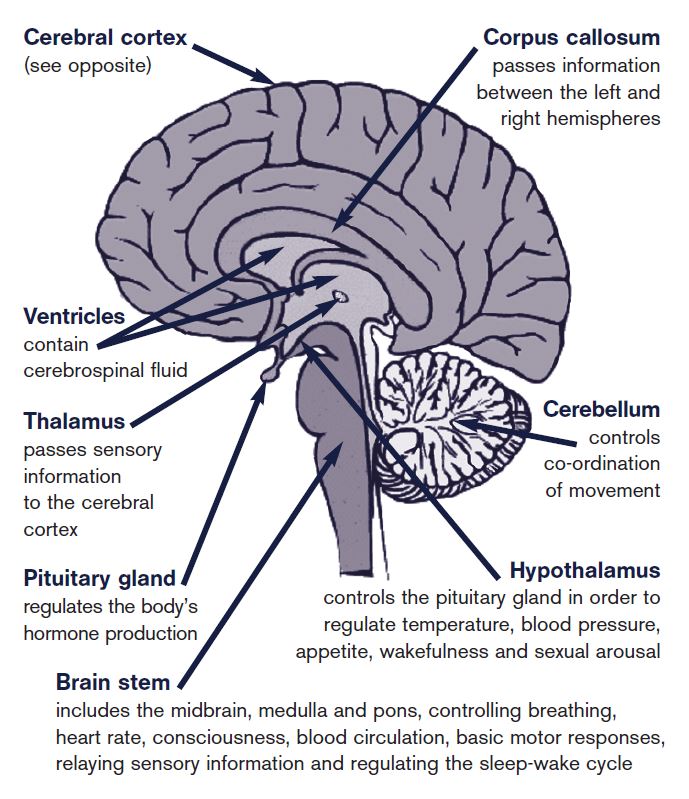Fatigue after brain injury Fatigue is an extreme tiredness and lack of energy.
Fatigue is experienced by everyone at some point after a period of physical or mental activity and is a signal from our bodies telling us to take a break.
‘Normal’ fatigue
'Normal' fatigue is time-limited and alleviated by rest.
‘Pathological’ fatigue
'Pathological' fatigue, such as that experienced following brain injury, may be present most of the time. It may not improve with rest and is likely to significantly impact on people being able to do the activities they want to do.
Explore the sections below to learn more about fatigue, a common effect of brain injury.
- What is fatigue?
- Causes of fatigue after brain injury
- Signs of fatigue after brain injury
- Triggers of fatigue
- Ways to manage fatigue
Find out more in our publication Fatigue after brain injury (PDF), or by exploring the links at the bottom of the page.
What is pathological fatigue?
Fatigue is described in many different ways, so there is no single definition of it. However, it is generally described as: an extreme tiredness and lack of energy, not relieved by sleep or rest.
People with fatigue also describe feeling exhausted, lacking in energy, weak, unable to motivate themselves, unable to focus on tasks, or sleepy.
Fatigue can affect people physically, mentally and emotionally.
Fatigue can affect a person’s ability to complete activities, work, complete activities of daily living or socialise with others. For some, it occurs during or after certain activities, and for others it seems to be present most of the time.
People often describe fatigue after brain injury as ‘fluctuating’. This means that it is not the same all of the time, but can worsen at different times of the day, or depending on activities completed. For example, people may experience worsened fatigue after a shopping trip, where they have to travel, park a car, follow a list and have a lot of light and noise to contend with.
What causes fatigue after brain injury?
Fatigue may be a result of direct damage to brain structures or due to other factors such as needing to make more of an effort to think or move. The brain system that appears to be linked to fatigue is the part that maintains alertness. This is known as the ascending reticular activating system (ARAS), and it links the brainstem with the thalamus, hypothalamus and cerebral cortex. The ARAS affects alertness by influencing the amount of information that the thalamus relays to conscious awareness.
Many people experience fatigue following brain injury, but the underlying causes are still poorly understood.

What factors affect fatigue after brain injury?
There are many factors that can make people more vulnerable to fatigue and affect how they respond to it. This can include the side effects from medication, pain, poor diet, lack of knowledge of brain injury and the presence of other medical conditions. It might be possible to manage some of these factors to improve fatigue, such as improving your diet or learning how to manage the effects of brain injury.
What are the signs of fatigue after brain injury?
In order to cope with fatigue you must first be able to recognise it. So how do you know when you are getting fatigued or fatigue is starting to build up?
The most important thing that you can do is to learn to 'tune in' to your body. Fatigue is your body's way of telling you to slow down and rest. Learning to spot the early signs of fatigue in your body can help you manage it effectively.
Some signs may include:
- yawning
- losing concentration/attention
- eyes feeling heavy, or eyesight blurring
- head feeling ‘fuzzy’
- fidgeting/getting irritable
- limbs feeling heavy
- stomach feeling sick
You can also start trying to identify situations that cause you to feel fatigued. For example, if you begin to notice that travelling on the bus makes you feel fatigued, then next time you need to travel on a bus you can plan your day more carefully to minimise the impact of this.
What triggers fatigue after brain injury?
Things that trigger fatigue will be different for everyone. Some examples of activities reported to be more tiring following a brain injury include:
- working at a computer
- dealing with paperwork/correspondence
- being in a busy environment such as a shopping centre
- concentrating on one conversation in a noisy place like a pub
- driving or catching public transport
It may take time to work out what your triggers are, so fatigue might feel difficult to control. However, it is likely that certain activities are more tiring for you; what are these? People around you may be able to help you to identify what these are.
You might want to consider monitoring your fatigue by rating how tired you feel before and after different activities, perhaps on a scale of 1-10. This may give you an idea of which activities you find more or less fatiguing.
It is important to recognise those activities or situations that are more tiring so that you can plan for them in your daily routine. Once you are aware of which activities are more or less tiring, then you can prioritise and set yourself realistic targets of what is achievable in a day.
How do I manage fatigue after brain injury?
For some people, fatigue improves naturally over time. However, for many people, fatigue is a condition that they have to learn to manage.
There is no cure for fatigue following brain injury. However, some strategies might be able to help, by addressing the factors contributing to it.
Managing fatigue requires a variety of strategies to address the factors that are contributing to it. Some of these strategies may seem like common sense and some you may already be applying. Taking the time to consistently put some of these principles into practice will hopefully allow you to cope better with everyday activities and feel more in control of your life.
Further information on these strategies and tips for coping are available in our publication Fatigue after brain injury (PDF).
- Visit the Supporting you section of our website to find out more.
- Remember you can find support from your nearest Headway group or branch.
- Our nurse-led helpline is also available to offer a listening ear and emotional support if you have any questions about living with the effects of brain injury.
Related information
Join Our Webinar on Fatigue After Brain Injury with Professor Avril Drummond
Click on Fatigue after brain injury for full details of how to join this webinar on Wednesday, 11 September.
Explore the links below to find out more about fatigue after brain injury.
My story
Lottie Butler
"Despite it being difficult to come to terms with my brain injury and its effects initially, I'm now eager to get my fatigue under control and start learning how to live with a brain injury."
Read storyDrained by fatigue? Try these 8 ways to cope after brain injury
Find out moreBrain Drain: Wake up to fatigue!
Through our Brain Drain campaign, we aim to give a voice to those affected, helping to raise awareness and break the stigma of brain injury-related fatigue.
Find out moreHormonal imbalances
Brain injury may occasionally cause damage to the hypothalamus and/or pituitary gland, which can lead to a range of symptoms caused by hormonal imbalances.
Find out moreTop tips for a good night's sleep
Sleep and rest are effective ways to reduce the symptoms of fatigue, one of the most common effects of a brain injury. However, for many brain injury survivors, a good night’s sleep isn’t always easil...
Find out more









